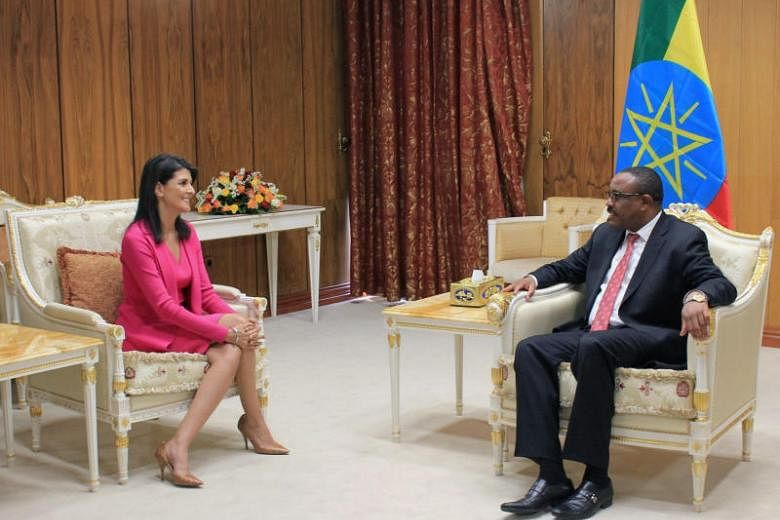ADDIS ABABA (REUTERS) - US Ambassador to the United Nations Nikki Haley arrived in Ethiopia on Monday (Oct 23), one of the first senior members of President Donald Trump's administration to visit Africa, on a trip diplomats hope will shed light on his plans to engage with the continent.
Africa is traditionally overshadowed by more urgent issues, and the Trump administration has so far been hands-off.
After meetings on Monday with Ethiopian Prime Minister Hailemariam Desalegn and a senior African Union official, Haley told reporters she hoped this was the beginning of "a stronger relationship with the AU and our African partners."
"The United States very much sees Africa as a very important part of the world. We see great opportunities in Africa, we see challenges in Africa, but we want to support and help in those situations," Haley said.
"But most importantly we want to see how we can partner together, whether that is through economic development, whether it is through strategic practices, whether it's through political solutions," she said.
Trump has been vocal about North Korea, Iran and tackling Islamic State militants during his first nine months in office, but said little about Africa until he held a lunch last month with nine leaders on the sidelines of the UN General Assembly.
It was there he announced he would send Haley to South Sudan and Democratic Republic of Congo to help with efforts to broker peace in both countries. Millions of people have been displaced by ongoing violence, with UN peacekeeping missions deployed in both, each costing more than US$1 billion (S$1.4 billion) annually.
Haley plans to take a critical look at the UN operations during her visits.
'DANGEROUS RESULTS'
Haley said she also plans to meet with South Sudan President Salva Kiir and Congolese President Joseph Kabila to "deliver a strong message that their governments need to stop making the work of aid workers and peace-keepers more difficult."
Some African diplomats hope Haley's trip will spark a conversation in Washington on the administration's broader engagement with Africa.
"We hope that after this trip the administration will sit down and maybe before the end of the year we can hear their Africa strategy," said a senior African diplomat at the United Nations, speaking on condition of anonymity.
"We would have wished it was earlier, but it's never too late."
Haley's visit to Africa comes after four US soldiers were killed during an Oct 4 ambush in Niger.
"The Niger crisis has shown that they can't take a hands-off approach to (Africa). They have to remain engaged because they have boots on the ground," said a second senior African diplomat at the United Nations, also speaking on condition of anonymity.
At his lunch with African leaders, Trump said there was"tremendous business potential" and he has friends "trying to get rich" in Africa. But he also noted the threat from militants such as Islamic State, al-Shabaab, Boko Haram and al Qaeda.
"The United States is proud to work with you to eradicate terrorist safe havens," he said. "And a number of you have told me ... that we've been doing a very good job over the last six or seven months in particular." However, in June the United States said it did not want the United Nations to fund a proposed African force to fight Islamist militants in West Africa, U.N. diplomats said. France on Friday pushed Washington to step up support for the force so it does not fail, leaving French troops to carry the burden.
Haley has been campaigning to cut U.N. peacekeeping costs, since the United States is the largest contributor.
'NO CLEAR DIRECTION'
UN human rights chief Zeid Ra'ad Al Hussein bluntly summed up US global engagement on Thursday as "caught somewhere between isolationism and militarism, with no clear direction in foreign policy apart from a few notable, exceptional, files".
As with most of the key regional bureaus at the US State Department, there is currently no permanent chief diplomat for Africa.
Rather, the Bureau of African Affairs is led by career diplomat Don Yamamoto as an acting assistant secretary of state.
While Yamamoto is an experienced Africa hand, diplomats say that leading any of the agency's regional bureaus in an acting capacity means that an official is not perceived abroad as having the full backing of the White House and has more limited influence at home within the US bureaucracy.
"They seem to be relying very heavily on their ambassadors on the ground and not having a Washington-centric approach to their relationship with Africa," said the second diplomat.
Haley's colleague in Trump's cabinet, US Trade Representative Robert Lighthizer, travelled to the West African nation of Togo in August to review a free trade pact with sub-Saharan Africa, but talks ended with no decision.
In April Defense Secretary Jim Mattis visited an important US military base in Djibouti.

